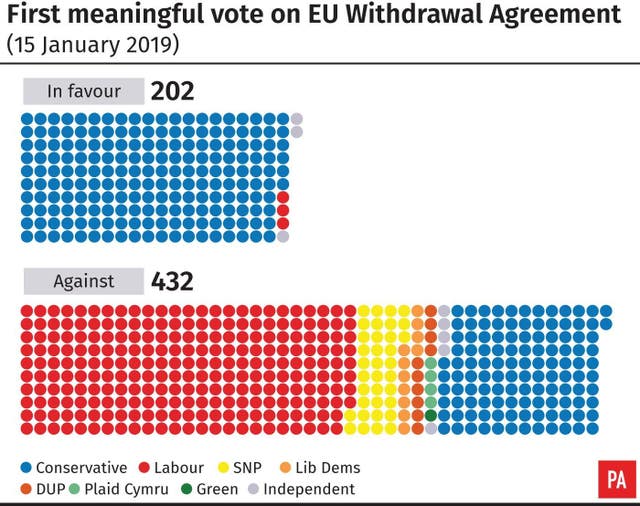Theresa May has urged MPs to “come together, to back this improved Brexit deal”, maintaining she has secured legal changes to the controversial backstop.
But has she done enough to she reverse the humiliating 230-vote defeat she suffered the last time the Commons passed judgment on her Brexit plan?
READ MORE: Brexit: Live updates ahead of second meaningful vote on EU withdrawal
There are 634 votes in play, which were split 202 in favour and 432 against on the last vote.
Mrs May needs at least another 116 votes on Tuesday night in order to reach the necessary 318 votes to give her a much sought-after majority.
634 votes are in play tonight (650 MPs minus 7 Sinn Fein, 1 speaker, 3 deputy speakers, 1 vacancy and the four tellers). Last time the 634 split 202 in favour, 432 against. #WithdrawalAgreement
— Ian Jones (@ian_a_jones) March 12, 2019
If for example she gained the support of 10 DUP MPs, 70 more Tories and 36 more Labour members, she could claim victory.
But the DUP MPs, whose support the Prime Minister relies on in the Commons, have not yet indicated whether Mrs May’s latest efforts are enough to convince them to support it.
They have said the deal needs “careful analysis”, and added that they will scrutinise the text “line by line” before forming a judgment.
 (PA Graphics)
(PA Graphics)
In what could be interpreted as a potentially positive sign, Jacob Rees-Mogg, chairman of the The European Research Group, described the deal as “clearly a step in the right direction”.
He said whether or not the DUP ends up supporting the deal will be “a very important and significant factor”.
Here’s @TheIndGroup amendment to the PM’s Brexit motion being debated today. Our position:✅ Indicative votes on the options by 21 March✅ Request an extension long enough to hold..✅ a #PeoplesVote on the option commanding a Commons majority✅ If necc revoke to stop no deal pic.twitter.com/PHJYu1NMki
— Chuka Umunna (@ChukaUmunna) March 12, 2019
Perhaps unsurprisingly, Labour leader Jeremy Corbyn has urged MPs to reject the deal, and Shadow Brexit secretary Sir Keir Starmer said he will be surprised if the changes that have been made are sufficient to allow the Attorney General to alter his most recent legal advice.
Prominent Tory backbencher Damian Collins, who backed remaining in the EU in 2016, said he will be voting against the Government’s motion, while former Brexit minister and ERG member Steve Baker said he thinks the deal “falls very far short of what the Government whipped us to vote for”.
READ MORE: Brexit: The amendments tabled by MPs ahead of second "meaningful vote"
Prominent Remain figure Nicky Morgan signalled support for the changes, while Tory pro-European Dominic Grieve said he would vote against the deal.
The Independent Group – the recently-formed contingent of 11 former Labour and Tory MPs – has tabled an amendment to the motion to be debated, calling for an extension to Article 50 so Parliament can agree the terms of a so-called People’s Vote.
– The current state of the parties is:
Conservative: 314
Labour: 245
SNP: 35
Lib Dems: 11
The Independent Group: 11
DUP: 10
Plaid Cymru: 4
Green: 1
Independents: 10



Why are you making commenting on The Herald only available to subscribers?
It should have been a safe space for informed debate, somewhere for readers to discuss issues around the biggest stories of the day, but all too often the below the line comments on most websites have become bogged down by off-topic discussions and abuse.
heraldscotland.com is tackling this problem by allowing only subscribers to comment.
We are doing this to improve the experience for our loyal readers and we believe it will reduce the ability of trolls and troublemakers, who occasionally find their way onto our site, to abuse our journalists and readers. We also hope it will help the comments section fulfil its promise as a part of Scotland's conversation with itself.
We are lucky at The Herald. We are read by an informed, educated readership who can add their knowledge and insights to our stories.
That is invaluable.
We are making the subscriber-only change to support our valued readers, who tell us they don't want the site cluttered up with irrelevant comments, untruths and abuse.
In the past, the journalist’s job was to collect and distribute information to the audience. Technology means that readers can shape a discussion. We look forward to hearing from you on heraldscotland.com
Comments & Moderation
Readers’ comments: You are personally liable for the content of any comments you upload to this website, so please act responsibly. We do not pre-moderate or monitor readers’ comments appearing on our websites, but we do post-moderate in response to complaints we receive or otherwise when a potential problem comes to our attention. You can make a complaint by using the ‘report this post’ link . We may then apply our discretion under the user terms to amend or delete comments.
Post moderation is undertaken full-time 9am-6pm on weekdays, and on a part-time basis outwith those hours.
Read the rules here